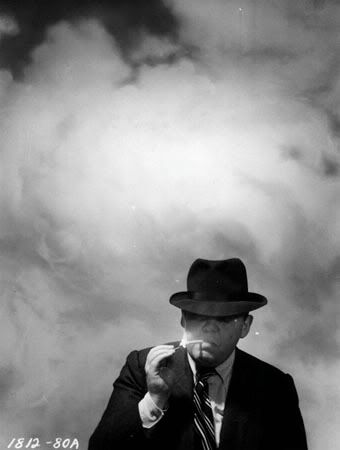
I just love this photo: it is one of the favourites in my collection of Laughton stills. It is to me a metaphore of how Laughton's talent set the world on fire, particularly in his décade prodigieuse of the thirties, where he awed the world with a string of great performances.
He's got a charming air canaille in the picture... Not unbecoming, as Laughton was enamored with France, a country whose language he spoke fluently. Being a francophile is not an usual choice for an Englishman, but then Laughton was a citizen of the world avant la lettre.
There's a date in the copy: 1939. Whereas this date refers to the year the photo was made or just the one in which it was printed, it is significative, for the clouds in the background seem a symbol of the bonfire that had burned Spain and was about to spread to Europe and the rest of the world. Laughton's own prospects were burnt-out as well: the films produced by "Mayflower Pictures", the film company he had set up with the legendary German producer Erich Pommer, hadn't met with the required success on their original releases. And Laughton, with the savings made by years of hard work gone, and broke, was again an actor badly in need for a job, and had to accept a contract with RKO pictures to clear his debts and that of his British film company .
As it happens, this would result in one of his greatest performances, and a fitting way to top his extraordinary work of the thirties: Quasimodo in "The Hunchback of Notre-dame". He and Pommer had thoughts of re-starting their company, which were definitely shattered by the start of the hostilities in Europe and its effects on foreign film markets.
But I digress... The subjet of this post wasn't actually that. In fact, I wanted to reflect about how different are our times from 1930. Had Laughton lived today, no doubt he'd be able to live his personal life more freely. But if our times are more tolerant on some areas, have grown more narrow minded in other regards... If Charles Laughton, actor, lived today... would be allowed to set the world on fire? Probably he wouldn't even be allowed to light a match!
Consider me a pessimist, but recent talk about Leonardo DiCaprio playing emperor Claudius in a prospective film version of Robert Graves' novel "I Claudius", or Jonathan Rhys Meyers playing Henry VIII in the TV series "The Tudors" doesn't strike me as good news.
Don't misunderstand me, I'm not meaning that these gentlemen can't do the job, but the thought of handsome, hunky guys playing historical characters that may have not been, precisely, the kind of people you'd see in a Hugo Boss advert, doesn't make me too happy.
And even less so, after reading a recent interview which I recently read in La Vanguardia's section "La Contra". On the October 22nd of the current year, Lluis Amiguet interviewed plastic surgeon Thomas Biggs. The doctor mentioned the case of a well-known character actor (1) who had to be operated urgently : seemingly, the actor was to play a romantic scene, and it turned out that he had a bit of double chin, which the director considered intolerable for the camera to capture...
In Laughton's times, an actor with talent could become a world-famous star even if he didn't look debonair. Nowadays, eugenics seem to rule, and soon non-hunky actors won't be even allowed to play bit character parts, however talented they might be.
Notes:
1) The victim of intolerance against normal looks, according to Dr. Biggs, was Ben Gazzara.





1 comment:
Los contenidos me parecen intersantes a priori,ya me lanzaré a leerte en inglés y a ponerte algún comentario en escrito, a pesar de que me siento bastante lejos por razón idiomática y sobre todo porque el pelotazo en el que estoy inmenso ahora mismo tiene el tamaño del peñón de Gibraltar
Post a Comment